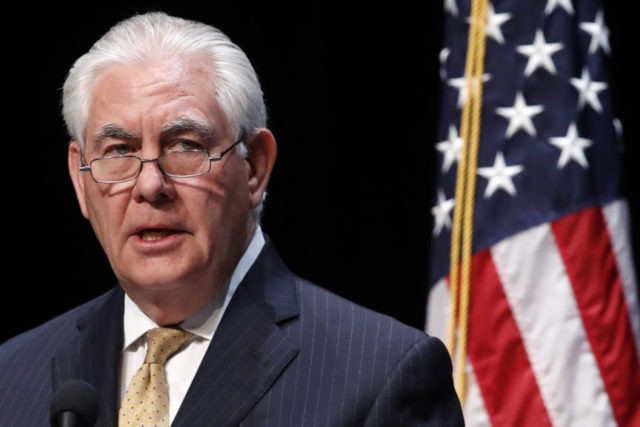The State Department’s top official on Africa told reporters Monday that Washington is growing concerned with China’s presence on the continent, particularly the “high rates of indebtedness” incurred by African countries accepting concessionary loans from Beijing.
The concern expressed over China’s “overall goals and operations” in Africa follow remarks made last year by Secretary of State Rex Tillerson warning African countries to steer clear of “predatory” loans from China, increasingly available to countries China wishes to bring into the fold of its global “One Belt, One Road” (OBOR) economic takeover plan. Tillerson will travel to Ethiopia, Kenya, Nigeria, Chad, and Djibouti between March 6 and March 13 on his first trip to the continent.
Acting Assistant Secretary for African Affairs Don Yamamoto took questions from reporters regarding this trip on Monday, addressing the growing Chinese role in the affected nations. He noted that China recently established its first permanent overseas military base in Djibouti, across the Gulf of Aden from Yemen, prompting many in Washington to wonder “what their overall goals and operations are on the continent.”
“And I think we need to have that discussion with China, and we are looking at what China is doing, not only in Djibouti but in other countries, particularly on the area of concessionary loan rates, which is providing high rates of indebtedness,” he told reporters.
In response to a question on China’s relationship with Zimbabwe after the fall of dictator Robert Mugabe, Yamamoto answered, “They have missions in almost all countries in Africa, except those countries which are pro-Taiwan. And we want to look at what is it that we can do to coordinate, cooperate, areas that we have concerns.”
Primary on the list of concerns, he explained, is China’s promotion of loans that may prevent developing African nations from fully realizing their economic potential, instead keeping them under the heel of the Chinese communist regime:
And the one area that I mentioned that we have concerns is the re-indebtedness of African states. Those of us who worked on the HIPC, the [Heavily Indebted Poor Countries], we took a lot of African countries off of debt in order to give them an opportunity for economic development, and so we would not want to see these countries get re-indebted again. And we’re seeing countries at 50%, 100%, and in one case 200% of GDP debt based on concessionary loans from China, but also other countries as well, and other institutions. And that’s going to other countries.
He added that the State Department also hopes to work to ensure “that there’s a rational exploitation and development of resources that benefits the countries and people where these resources lie.” While not mentioning the OBOR program, those alarmed by the plan have raised the concern that China’s infrastructure development in Africa, the Middle East, and beyond may only benefit host countries in the short term, then hand China nearly-boundless control over resources.
Yamamoto also offered praise to China for playing “a positive role in U.N. operations in Sudan” and prompting productive discussions on expanding healthcare in Africa.
OBOR is a global infrastructure project Chinese leader Xi Jinping insists is primarily concerned with recreating the ancient silk road. The “Silk Road Economic Belt” is mainly a series of land projects aimed at connecting China to western Europe, focused on building roads, railroads and stations, checkpoints, and other necessary infrastructure to improve cargo transport. The Maritime Silk Road is the sea-based analog to this project: a plan to build shipping ports throughout Asia, the South China Sea, and Africa to connect the three continents.
Chinese officials claim the plan will bring millions of local jobs to the countries it spans. Once the projects are complete, however, China will retain full control over brand-new roads and ports pivotal to the efficient extraction of resources in the area. China has also begun setting the precedent that any projects built abroad allow it to import totalitarian Chinese communist law to foreign soil.
Many of China’s loans to African countries involve the development of infrastructure projects for OBOR.
A report published by the Centre for Global Development this week warned that OBOR projects are placing many of the countries it is affecting at risk for entering unsustainable debts. The report particularly mentioned Djibouti, Kyrgyzstan, Laos, the Maldives, Mongolia, Montenegro, Pakistan and Tajikistan as being “at particular risk of debt distress.”
In addition to Tillerson’s warning against a “predatory” Chinese economic policy, the White House’s National Security Strategy identified China as a “strategic competitor using predatory economics to intimidate its neighbors while militarizing features in the South China Sea.”
China claims territory in the South China Sea belonging to Vietnam, the Philippines, Brunei, Taiwan, and Malaysia, despite an international tribunal ruling against its claims in 2016.
The Chinese Foreign Ministry responded to concerns regarding its debt policies in its regular briefing Tuesday, claiming that “China is not a main creditor of African countries” and that China is merely providing much-needed financing to the developing world.
“The Chinese companies have built a large number of infrastructure projects such as highways, railways, ports, airports and communications facilities in Africa, which greatly improved the environment for Africa’s economic development, added to its appeal to foreign investment and enhanced its capability to achieve self-driven development,” spokesman Geng Shuang argued. “I would like to stress in particular that China always attaches high importance to Africa’s debt sustainability. We are committed to intensive development. The large infrastructure projects are planned and moved forward along with promoting Africa’s industrial development.”

COMMENTS
Please let us know if you're having issues with commenting.